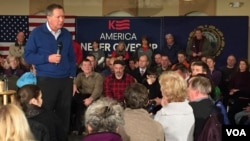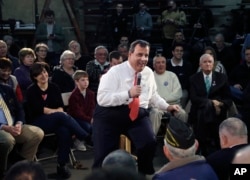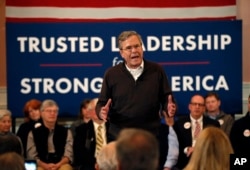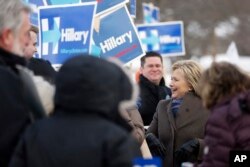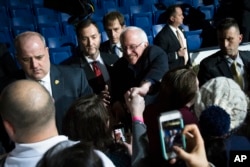Voters filled town hall meetings and rallies across New Hampshire in the hours before the nation’s first presidential primary.
Many came out despite a snowstorm because they had not yet made a final decision. According to polls, up to 50 percent of New Hampshire voters were still making up their minds in the days before the election.
On Monday, Chris Christie got down on one knee at a town hall in Hudson, New Hampshire, to convince one undecided voter to vote for him based on his answer about Social Security.
Later in the day, at a John Kasich town hall meeting in Manchester, only a handful of voters in a room of hundreds raised their hands when asked if they had decided upon a candidate.
Decision-making process
Wayne Morris, an undecided voter from Manchester, said the town hall format helped his decision-making process.
Morris said his choice was between Ohio Governor John Kasich and former Florida Governor Jeb Bush, who he saw speak at a town hall last week. He acknowledged that both governors were strong on national defense and budgeting.
Before the Kasich town hall, Morris said, “I will be listening and recalling what Governor Bush said.”
Afterward, Morris said he was impressed by Kasich’s “genuine demeanor” and was as close as he could be to voting for him.
The town hall is a key element in the decision-making process for many New Hampshire voters, said Chris Galdieri, assistant professor of political science at Saint Anselm College. He said many will not commit to a candidate until they have the opportunity ask them a policy question face to face.
“Voters here have the time to meet the candidates, more than once, to attend multiple events with multiple candidates and really do their shopping,” Galdieri said.
Limited choices
The smaller field of Democratic candidates doesn’t lessen the difficulty of choosing for voters.
Melanie Currier, an undecided voter from Weare, New Hampshire, said former Secretary of State Hillary Clinton’s policy differences on gun control and foreign affairs set her apart from rival Vermont Senator Bernie Sanders.
“The more I looked at it, the more I realized everything that’s been thrown at Hillary, she continues to stand, I just felt she’s strong,” Currier said.
In a field crowded with Republican presidential candidates, personalities and interactions with candidates help voters determine key differences.
At the Kasich rally, Debbie Repson said her family had “dragged” her to a Jeb Bush event and took her along to see Ted Cruz. She said she found Bush “a reasonable and thoughtful” person despite not wanting to see another member of his family as president.
Before the rally, Repson said the key factor in her decision would be to see how Kasich “responds to people.” She liked the way Bush responded directly to questions in his town hall meeting.
Repson's husband, Jeff, said the primary vote had been a family discussion. They both ruled out “one-term senators and the hyperbole that comes with others,” leaving a choice of governors.
“Hopefully we can come to a conclusion in the next 12 hours. We’ll be in the voting booth pretty early in the morning,” Repson said.
The decision turned out to be easy. Debbie Repson – who works as a school teacher – asked Governor Kasich a question about education during the town hall and said afterward that she was pleased with his detailed response.
“I think I made up my mind. I think I’m going to vote for John Kasich,” she said.
William Gallo contributed to this report.




